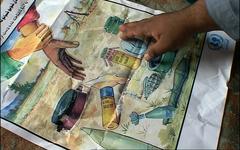Review of Land Mines - A Love Story in the Australian newspaper
11 May 2005

The Weekend Australian
SAT 07 MAY 2005, Page R23
After the pain, life goes on
By Evan Williams
Land Mines: A Love Story (PG)
****
Sydney, Melbourne, Brisbane (Canberra next week)
Land Mines: A Love Story is the latest documentary from Dennis O'Rourke , the Australian film-maker whose previous film, Cunnamulla, troubled some people with its revelations of the sexual behaviour of young girls in an outback town in Queensland. Cunnamulla was a fine and honest film, and O'Rourke has followed it with an even better one: an intimate look at the marriage of an Afghan soldier and his young wife, both of whom have had legs blown off by landmines and walk with prosthetic limbs. Not a great start to married life, you would think, but O'Rourke 's film may surprise you.
Thousands of these mines still litter the roadsides of Afghanistan, a legacy of the country's long war with the Soviet Union and the US invasion in pursuit of al-Qa'ida. Mines were laid everywhere -- hidden under the soil or dropped from planes -- waiting to blow off a limb or blind some unwary victim. O'Rourke 's film is a reminder of the horrors still visited on innocent people by these vile devices and the extreme difficulty of getting rid of them. But it's not a propaganda film, either in its tone or its principal aim. True, there are some telling statistics, and one or two clips of GeorgeW. Bush in sanctimonious vein, but the film makes its points lightly and subtly and is all the more powerful for being understated.
I was especially moved by the scenes filmed in classrooms in Kabul showing children being instructed in the perils of the mines. None of this is especially harrowing -- one is struck by a strange mood of levity and good cheer -- but what are we to make of these eager young faces as they chant their answers to questions from their teachers? "Can we buy new fingers?'' "No!'' "Can the Americans give us new fingers?'' "No!'' It seems that landmines, and the no less dangerous cluster bombs scattered by US aircraft, come in all sorts of familiar domestic shapes and sizes -- "sugar bowls, gas burners, bars of soap''. And if O'Rourke 's statistics are any guide, it is quite likely that some of these children will have fallen victim to them since the film was made.
But all of this is incidental to the film's main theme, the marriage of Shah and Habiba. I had vaguely assumed that Muslim men would be reluctant to talk about their private lives and had heard all of those stories about stern Muslim attitudes to women. But Shah comes across as a man of radiant good humour andvitality.
He was once a soldier for the mujahidin, but works now as a cobbler, repairing shoes (and prosthetic limbs) while Habiba begs in the streets. We first see her, 19 years old, covered with a tent-like hood, looking like some blue-shrouded ghost as she drifts among the crowds in the market square. Between them Shah and Habib make barely enough to feed their three children -- the scenes with the children, suffused with love and tenderness, are among the most affecting -- but neither seems to harbour any bitterness or any anger.
Behind the unhurried rhythms of life in war-torn Kabul we sense change in the air. Not even the Taliban could keep global influences at bay forever. Students are offered a range of training courses -- "computers or carpet weaving'' -- and a starker choice between traditional ways of life and the enticements of modern technology could scarcely be imagined. It's a little jewel of a film: gentle, delicate, probing. And who, I wonder, thought of using Schoenberg's Transfigured Night, scored for string sextet, as the music? Was this O'Rourke 's inspiration? These bitter, sorrowful yet strangely exhilarating sounds seem perfectly attuned to his purposes.




